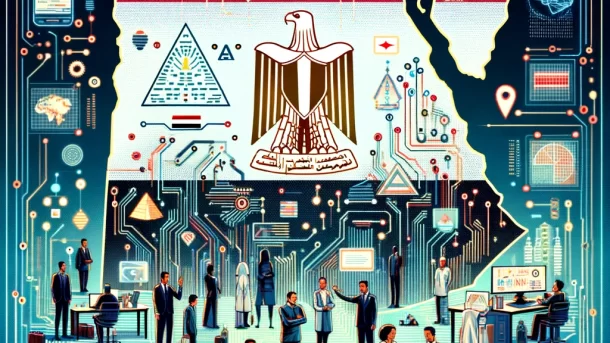In a significant move towards embracing the digital future, the Egyptian Cabinet approved the formation of the National Council for Artificial Intelligence (NCAI) in November 2019. Comprising representatives from various government entities and independent experts in the field, the NCAI is tasked with formalizing and governing the implementation of Egypt’s National AI Strategy.
This document represents the culmination of efforts by the Technical Committee of the National Council, building on previous work carried out in 2019 by the Ministry of Communications and Information Technology and the Ministry of Higher Education and Scientific Research, with contributions from independent experts and private sector companies.
The Vision and Objectives of Egypt’s National AI Strategy
Recent studies and economic indicators highlight the net positive effect that AI integration can have on international economies. Egypt is poised to capitalize on the opportunities presented by AI, provided there is the right investment climate and a robust upskilling/reskilling strategy for its workforce.
The primary vision of Egypt’s National AI Strategy is twofold:
Exploit AI technologies to support the achievement of Egypt’s sustainable development goals for the benefit of all Egyptians.
Establish Egypt as a key player in regional cooperation within the African and Arab regions and as an active international player in AI.
The Four Pillars of the Strategy
The strategy is built on four pillars, each focusing on a different aspect of AI integration and development:
- AI for Government: Rapid adoption of AI technologies to automate government processes and embed AI into the decision-making cycle to increase efficiency and transparency.
- AI for Development: Application of AI in various economic sectors, starting with priority areas such as Agriculture, Environment, Water Management, Healthcare, Arabic Natural Language Processing (NLP), Economic Planning and Development, Manufacturing, and Smart Infrastructure Management.
- Capacity Building: Preparing the Egyptian population for the age of AI at all levels, from general awareness to education and professional training.
- International Activities: Fostering cooperation on regional and international levels, representing African and Arab positions, and actively participating in AI-related discussions and projects.
Enablers of the Strategy
Supporting these four pillars are four key enablers:
- Governance: Including ethics, laws, regulations, tracking, and monitoring.
- Data: Including collection, management, and monetization strategies.
- Ecosystem: Including the private sector, research and academia, and civil society.
- Infrastructure: Including fair access to compute, storage, networking, and other assets.
Implementation and Phases
The strategy will be implemented in a phased approach. The first phase, which started in 2020 and lasts until the end of 2022, focuses on training graduates and professionals to meet market needs, proving the value of AI in strategic sectors through pilot projects, building regional bridges for unified AI efforts, and actively participating in international organizations on topics such as AI ethics and the impact of AI on labor markets and education. Preparations for the second phase will assess further priority sectors and focus on growing the ecosystem, especially startups. An operational plan will be issued for further phases in due course.
Conclusion
The National Council for AI (NCAI) will oversee the implementation of this strategy, setting and tracking relevant KPIs to measure progress and make necessary adjustments. Through this comprehensive strategy, Egypt aims not only to harness the power of AI for its own sustainable development but also to establish itself as a leader in AI innovation and cooperation on both regional and international stages.




